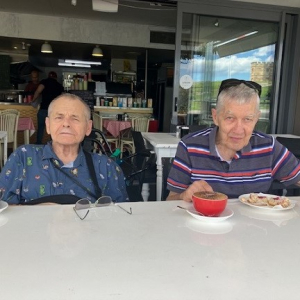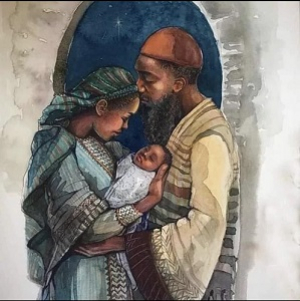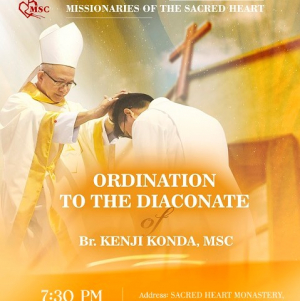Peter MALONE
MSC Who and Where, 2023, St Joseph’s Care
MSC Who and Where, 2023, St Joseph’s Care
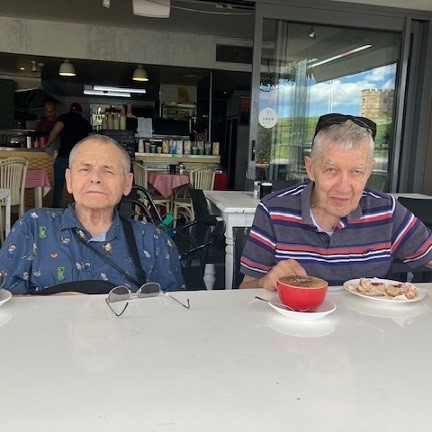
Henk and Noel on an outing to La Perouse
At this time of the Feast of St Joseph it seemed a good idea to begin our series of Who and Where in the Province for 2023 at St Joseph’s Care, Kensington.
Six of our men live there. Our two senior MSC, Albert and Reg, will turn 98 later this year.
Albert Yelds, in colleges, Chevalier, Sacred Heart ministry, India, Kiribati – and celebrating 70 years of priesthood in July.
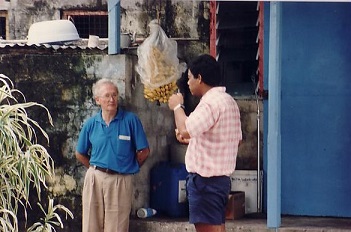
Reg Pritchard, more than 60 years in colleges and St Mary’s Towers, Douglas Park.

Noel Mansfield turned 90 on New Year’s Day – colleges, missions, more recently in Adelaide parishes.

Seen here in a recent photo with Cardinal John Ribat MSC
Terry Naughton, many years at Daramalan College, Chevalier, Formation and Novice Master at St Mary’s Towers, Douglas Park.
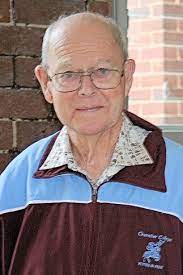
Henk Bosman, originally from Holland, in colleges and more recently at Kensington Monastery.
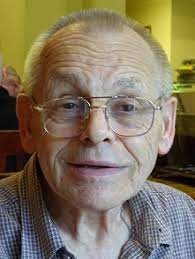
Chris Murphy, teaching in colleges, many years in parishes, Kensington, Canberra, Adelaide, Blackburn

Emily the Criminal
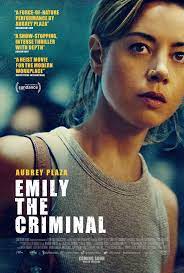
EMILY THE CRIMINAL
US, 2022, 97 minutes, Colour.
Aubrey Plaza, Theo Rossi, Gina Gershon.
Directed by John Patton Ford.
This is a rather small budget film, a portrait of an arresting character, played with confidence and aplomb by Aubrey Plaza who has shown a great versatility in her choice of roles, farcical comedies, serious dramas, and a role in the award-winning The White Lotus.
Here she plays a young woman, talented as an artist, falling on hard times, working in a diner with home deliveries. She has a friend from high school who leads the high life, international travel, working in an advertising agency, Emily hoping to get an interview at the agency (and when she does, she is demandingly assertive and walks out).
Agreeing to take an extra shift at the diner, her co-worker gives her an address that will gain her some quick money. It turns out to be an organisation that has dummy shoppers, printing all kinds of credit cards, getting the members of the organisation to do the shopping, bring home the goods, get $200. They let people know that there are further stings to be made. Emily decides to go for this, becomes friendly with the leader, Youcef, Theo Rossi, and participates in some of the stings, one of which is split second, causing her to escape and a car chase.
Complications when Youcef’s partner robs him before Youcef can rob the partner – but, Emily asserting herself, pushing Youcef, getting the money – escaping to Mexico and setting up this kind of business herself.
Arresting in its amoral way.
- The film living up to its title? The focus on Emily as a person, character, her criminal trajectory?
- The LA settings, apartments, warehouses, shopping centres, authentic? The musical score?
- Aubrey Plaza as Emily, tough, hard and, yet soft spots? Her background? High school? Art and sketching? Talent? Family responsibilities? Working in the kitchen, the deliveries? Her high school friend, her job, the advertising agency, the possibility of an interview? Javier and his son, asking her to fill in, giving her the number, her going to the meeting, the proposal about the dummy shopping, the card supplied, the possibility of opting out, her staying in, success? The invitation to return? Taking it up? The interactions with Youcef? Her becoming more fully involved, the range of elaborate schemes, the variety of cards, the buying of the car, the interview, checking her credentials, the time limit to get out, the story about the car, her being stopped, driving off, the pursuit?
- The background of her friend, the travels, minding her dog? Meeting at the bar, the drinking? The eventual interview, being an apprentice, not being paid, her outburst at the interview, walking out?
- Youcef, his partners, the team work, the making of the cards, the machine, his explaining it to Emily, are using the machine, making the cards? Youcef and his ambitions, the visits to his mother and her admiration?
- Youcef and his partners, the doublecross, his planning to rob them, their robbing him, Emily and her morale boosting for Youcef, the plan, her taking charge, his being wounded, her getting the money, leaving?
- Emily, on our own, her determination, taking the money, moving to Mexico, a new life, setting up her own dummy shopper business?
A Caribbean Mystery/ 1989
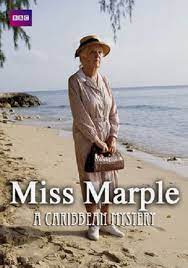
A CARIBBEAN MYSTERY
UK, 1989, 104 minutes, Colour.
Joan Hickson, Donald Pleasence, Adrien Lukis, Sophie Ward, T.P.McKenna, Michael Feast, Sheila Ruskin, Frank Middlemass, Robert Swann, Sue Lloyd, Barbara Barnes, Stephen Bent, Joseph Modell, Valerie Buchanan, Isabel Lucas.
Directed by Christopher Pettit.
Miss Marple has had an extraordinary screen career, on the big screen with Angela Lansbury in The Mirror Crack’d. But, especially on the television screen, a succession of very different actresses, Joan Hickson, Geraldine McEwan, Julia Mackenzie.
She was also played by American actress, Helen Hayes, in some American television films, including a version of A Caribbean Mystery – which follows quite closely this present adaptation.
This is very much Joan Hickson as Miss Marple, elderly, always knitting, observing, curious, noticing clues, sometimes missing them, but finally a solution.
It is a surprise to find her having a holiday in the Caribbean, after being unwell, a gift from her novelist nephew, Raymond (played briefly at the end of this film by the screenwriter T R.Bowen.)
The film has the exotic Caribbean setting, some of the local culture, the police authorities, maids and hotels, village life, funeral – and a belief that at a funeral night, vengeance on a murderer will be wrought. And, in this film, it does.
There is a strong supporting cast led by Donald Pleasance as an obnoxious and demanding businessman, T.P.McKenna as the local doctor, Frank Middlemass has a gossiping and drinking former major, and Sophie Ward is the victim of the conspiracy.
- The popularity of Agatha Christie mysteries? Miss Marple? The three actresses, Joan Hickson’s status?
- The popularity of A Caribbean Mystery, the various versions?
- The introduction, Miss Marple and her not being well, her nephew giving her the holiday, the background of St Mary Mead, in the Caribbean, relaxing, the hotel, her continued meeting, her clothes, sunning herself, observing?
- The major, his talk, drinking, boring everyone, his discovering a murderer, the the issue of his having only one eye and Miss Marple’s wrong interpretation of where he was looking? His talk, the dining room, drinking, the medication, his heart attack, his death?
- The range of people at the hotel, the cross-section, suspicions? Edward Hillingdon and his butterflies, his continued study, alienation from his wife, her seriousness, thinking of the children? Hillingdon and his relationship with Lucky Dyson, Greg Dyson second wife, her style, seductive? The pressures on Hillingdon? Greg Dyson, American, the butterfly named after him, millionaire?
- Mr Rafiel, wealthy, cantankerous, demanding, his assistant, Esther, looking after him, his continually correcting her? Jackson, the physiotherapist? Mr Rafiel and his attitude towards Miss Marple, underestimating her, the conversations, wanting to unravel the mystery?
- Tim and Molly, the hotel, hospitable to the guests, charming, Molly and her anxieties, worries, the book about mental illness under the mattress, her turns, medication, erratic behaviour?
- Victoria, the maid, local, Miss Marple friendly, the visit to Aunty Johnson, Miss Marple and the local culture, Victoria, the medication, her death? The family response, the funeral, and the vengeance on the killer on the night of the funeral?
- The doctor, his role on the island, continually in attendance, diagnosis, the issue of the Major’s tablets, appearing and disappearing? Jackson later appearing and investigating in the Major’s bathroom?
- The local police, taking charge, the arrogance of the British representative, interrogations?
- Miss Marple, her watching, the concern about Molly? Molly, going for her walk, Hillingdon going to find her, the discovery of Victoria’s body? Molly’s collapse? Lucky’s death, a mistake?
- The revelation about Tim, the screenplay not pointing the camera at him, the truth?
- A satisfactory Miss Marple investigation?
Till
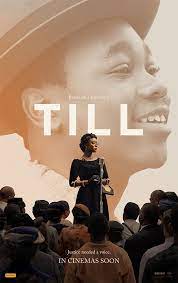
TILL
US, 2022, 130 minutes, Colour.
Danielle Deadwyler, Jalyn Hall, Whoopi Goldberg, Sean Patrick Thomas, John Douglas Thompson, Enoch King, Haley Bennett.
Directed by Chinonye Chukwu.
Till provides its audience with a highly emotional experience. It is based on historical events in 1955, in the American South. It is a film about racism and injustice towards black Americans.
The screenplay is partly based on research by investigator, Kenneth Beauchamp, who for many decades investigated the background of the murder of Emmett Till and the perpetrators. By 2004, his work influenced legislation, The Emmett Till Anti-lynching Act, making lynching a hate crime. This came half a century after the murder of Emmett Till. A documentary based on Beauchamp’s work was released in 2005.
In fact, there have been quite a number of films about such murders in Mississippi in the 1950s and 1960s, including films about activist, Medgar Evers (For Us the Living), Murder in Mississippi, Ghosts of Mississippi, the murder of the young civil rights workers from the North, killed in the South in 1966), Mississippi Burning…
This film has two parts. The first part is the focus on Emmett Till and his mother, Mamie, their life in Chicago, his visiting the South to see his cousins, his abduction and murder, and his mother demanding the return of his body to Chicago. The second part of the film focuses on the trial of the accused, the white audience, the segregated Blacks, lies on the stand, the verdict.
The film recreates the period quite vividly, the look of Chicago’s streets, buildings, offices, neighbourhoods, costumes and decor, cars… And, it recreates the atmosphere of the South, the small town of Money, the streets, the general store, the cotton fields, the homes of the African-Americans.
Danielle Deadwyler (The Devil to Pay) gives a commanding performance as Emmett’s mother, Mamie. Widowed during World War II, her son is now 14. She is loving, devoted, even possessive. She is supported by her mother, played by Whoopi Goldberg, supported by her absent father. She is anxious about letting Emmett visit the South, wanting letters, phone calls, continually concerned.
There are touches for humour in Emmett’s visit, a cheerful young man, bonding with his uncle and nephews, finding it too hard to work in the cotton fields, with his cousins in town, going into a store with a stern white woman behind the counter, wanting some candy, talking with 14-year-old flirtation, then a wolf whistle. His cousins are afraid – and the woman’s relatives come to the house, demand Emmett, taking him away, torturing and brutally killing him (this happening offscreen).
This part of the film is quite harrowing, emphasised by the high outbursts of grief on Mamie’s part, weeping, howling, lamenting – demanding the body be brought, watching the body (this time in close-up with its torture and wounds), making demands on local authorities, on the NAACP, wanting justice to be done.
The court case turns out to be as we might have anticipated, a big number of large, older white men (including the jury), the presiding judge, the Blacks having to stand the back of the court, Mamie coming with her defence team. But, before the case, she visits the site of the store – and confronts her cousin for not defending Emmett, his protecting his own family.
One of the appalling sequences is with the woman from the store in the witness box, telling elaborate lies about Emmett, demonstrating how he attacked her… Mamie knows how the verdict will come out and leaves before it is pronounced. We are told at the end that the abductors were freed, sold their story to Look Magazine and lived comfortable lives, the woman who lied also going free, never challenged.
Mamie devoted her life to campaigning on behalf of African-American rights.
- A drama based on the story of Emmett Till, Chicago, his visit to the south, his behaviour, his being lynched? The response of his mother? The trial and the atmosphere of racism in the 1950s?
- The re-creation of the period, Chicago, the African-Americans in Chicago, the greater tradition of freedom? The contrast with the South, the racism, segregation, racist behaviour taken for granted? The African-Americans in the south, their place, segregated, working in the cotton fields, insulted? At the back of the court? The warnings from those from the North to keep their place when visiting the South?
- The period, the city, buildings, streets, cars? The South, the small town, the shop, the streets, the African-American homes, the cotton fields? The courts? The musical score?
- The two halves of the film, the focus on Emmett and his mother, the bond between them, her apprehensive about his going south, the Preacher and the cousins? Her continued concern? The second half of the film, the discovery of Emmett’s body, the morgue, the trial?
- Emmett, 14, his father dead in World War II, the relationship with his mother, wearing his father’s ring and identified by it, Gene and his looking after Emmett and Mamie? Life, comfortable, Mamie and her touch of being possessive, her constant worrying, discussions with Preacher, seeing Emmett off at the station? Mamie and her work, the only black woman in the office? Gene and his support?
- Emmett, in the south, in the house, with the cotton, his finding it too hard, the friendly cousins, in the town, the shop, his wanting to buy candy, the attitude of the woman, his flirtatious behaviour, outside and the wolf whistle? The cousins and their apprehensiveness? Going home, Preacher and his being wary?
- Mamie, her mother, the scenes with her, support, her estranged father, his support, travelling with her to the south? Her mother’s grief at Emmett’s death?
- The abductors, in the car, with the woman from the store nodding, intruding into the house, guns, Preacher and the gun in the house, protecting his family, their dragging Emmett away, the longshot of their attack on him, the rest of the violence not shown on screen?
- Mamie, getting the news, her emotional collapse? Expressing her grief, tears, howls? Gene and his support? Her wanting the body brought to Chicago, its arrival, the mortuary, the smell of the body, her looking at her son, the graphic scenes of his torture, the gunshot, mutilation? The audience being forced to look at Emmett and experience what he suffered?
- The court case, Mamie and her decision to go, the dangers? Her appearance, her dignity, commanding presence? Her clothes and style? Not wanting Gene to come?
- With the family, her attack on Preacher, seeing the rifle, her criticism in and his defence of his family? Talking with him out in the woods? The young cousins and their apology?
- The visit to the town, Money, outside the shop, its being closed since the event?
- The court, the crowd of racist whites, the white man jury, the judge and his handling the court, the Blacks at the back, the prosecutor, the defence, Mamie and the lawyers and the special section?
- The Chicago background, the NCAA P, the lawyers, coming to visit and Mamie making demands, the interviews at the NCAA P, the presence at the trial? Demands about the trial?
- The interrogations, the woman and her lies, creating the full story about what Emmett did and said, her demonstrating the attack? The attackers, their stories? Mamie and her being interrogated? Her leaving before the end of the trial, knowing the verdict?
- The verdict, the cover up, the later information about the abductors and their selling their story to Look magazine, never apprehended? Nothing happening to the woman?
- Mamie, her speech, work with the NCAA P, a campaigner, marrying Gene, a long life and social activities?
- A story of the 1950s, the period of Rosa Parks, early action of Martin Luther King? The introduction of Medgar Evers, his presence, care for Mamie, his wife and her action, and the later story of the assassination of Medgar Evers? The white campaigners in Mississippi and their murder in the 1960s? The screenwriter, Kenneth Beauchamp, and his long investigations into the case, and the changing of the legislation, the Emmett Till legislation in 2004?
Money Shot: The Pornhub Story
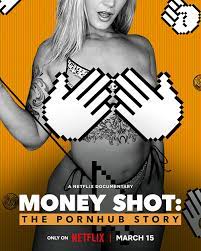
Between a Frock and a Hard Place
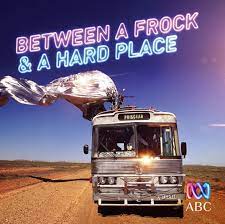
BETWEEN A FROCK AND A HARD PLACE
Australia, 2015, 57 minutes, Colour.
Narrated by Terence Stamp.
Directed by Paul Clarke, Alex Barry.
When writer-director Stephan Elliott was writing and directing Priscilla, Queen of the Desert, in the early 1990s, he could not dream of how popular the film would be, not only in Australia, but around the world.
12 years after the release of the film, this documentary offers actor, Terence Stamp, the opportunity to reflect on his taking on of the role of the transgender, Bernadette, his hesitations, the demands on him, the experience. He is seen at a desk, at the microphone, and makes his observations throughout the documentary.
Are also interviews with the director, this his second film, his background growing up in Australia, the issue of his gay orientation, the status of gay men in Australian society in the 1970s and 1980s, legislation, the first gay Mardi Gras in Sydney in 1978, the club at Kings Cross, the Drag Queens, the audiences. And there are comments from “ordinary Australian” men, homophobic, anti-poofter.
Throughout the film there are excerpts of interviews with Hugo Weaving, his acting background, coming to Australia, his career, the effect of Priscilla? There are interviews with Guy Pearce. There are interviews with the producer, Al Clarke. There are comments about Bill Hunter and his role, and Terence Stamp suggestion that he take this role.
One of the key characters in the background of Priscilla is the Drag Queen, Cindy Pastel (Richie Finger), who migrated to Australia, entered the Drag Queen scene in Kings Cross, but also married, had a son, Adam – which led to that particular plotline concerning Hugo Weaving’s character, his son, his estranged wife, the reconciliation. And the comment from Cindy Pastel about watching this sequence in Cannes with his son.
So much of this documentary is focused on the making of… The ideas, the costume design, the choice of songs, the testing of the actors, going out into Oxford Street in full drag, becoming accustomed to the costumes and their roles.
And, there is the celebration of the material made for Priscilla, the bus, and the sweeping silver sail as the bus went through the Australian countryside. The encounter with aborigines. And the three on King’s Canyon.
There are comments about the success of Priscilla at the Cannes film Festival, its becoming an international success, winning an Oscar for costumes, and then the development of the film into the stage musical and its performances throughout the world, culminating in scenes in Korea.
The Adventures of Priscilla, Queen of the Desert made a mark in 1993, but has emerged as a landmark in Australian cinema as well as in changing attitudes towards the gay community.
My Neighbor Adolf
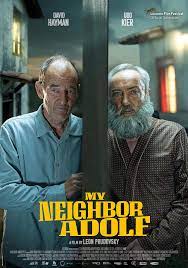
MY NEIGHBOR ADOLF
Poland/Israel/Columbia, 2022, 96 minutes, Colour.
David Hayman, Udo Keir, Olivia Silhavy, Kineret Peled.
Directed by Leon Prudovsky.
This is a small entertaining film, with some expected developments and some unexpected twists.
Interestingly, this is a Polish-Israeli production, filmed in Latin America, in Colombia. The film will have great appeal to Jewish audiences around the world, especially those with sad memories. The film will appeal to the older generation – one hopes that the memory of the Holocaust is still vivid but it is almost 80 years since the demise of Hitler and the Nazis, generations ago for younger audiences.
The film opens in Eastern Europe in 1934, a vignette of a Jewish family, gathered together, the father with his new camera, the family posing for a group photo, and a focus on the black roses especially grown in their garden. The photo will have a significant place in the memory of the father.
The film then moves almost 30 years on, and 15 years after the end of World War II, 1960. We see some newspaper headlines that Adolf Eichmann has been tracked down in Argentina and apprehended. So, we are introduced to the setting of many of the Nazi regime seeking refuge in Latin America, hiding there.
But, this is a story of Mr Polsky, a wonderful performance by British actor, David Hayman, the father of that initial family, the sole survivor of the concentration camps, living a secluded life in the hills of Colombia. He has the photo, the memories, and is growing black roses.
But, of course, the title is arresting. The name Adolf immediately conjures up Hitler – and it was the name also of Eichmann. And, the mention of neighbour in the title, surely indicates that there is going to be a lot of unneighbourly activity, over the fence hostilities, each neighbour out to defeat the other. And, more or less, this happens.
First comes the intrusion of a German woman, Frau Katenbrunner, who upsets Mr Polsky who resists any neighbours in the dilapidated next door deserted house. But, then the neighbour arrives, along with trucks and carriers for his luggage. He is elderly, has grey hair, a large grey beard, and wears dark glasses all the time. An unexpected and fine performance from Udo Keir. And he has a dog, Wolfie. It is Wolfie who initiates hostilities, getting through a pale in the fence, leaving his calling card, disturbing the roses. Confrontation looms immediately.
And the Adolf? Mr Polsky starts to see resemblances to this strange neighbour and Hitler himself, the blue eyes concealed, the look, and he starts to research Hitler in the books that he has, in newspaper articles, ticking off all the characteristics he finds in his neighbour, left-handed, bad temper, teetotal, vegetarian, painter of ruins, certain that this is Hitler. But, in his visits to the Israeli office, he is met by stern scepticism no matter what the evidence he produces.
Chess is at the centre of the story and, before long, for good or for ill, the two men are playing chess – which does give the opportunity for Mr Polsky to search his neighbour’s house, finding a locked steel box. But, some moments of doubt as the neighbour paints a genial portrait of Mr Polsky (though in Hitler’s style!), actually drinks, makes some suggestive remarks about Frau Kaltenbrunner.
Probably enough said about the plot – but, we can say tantalisingly, that it does not all work out as we might have anticipated (except, perhaps, Mr Polsky battering Wolfie with his shovel).
This is a small fable, appealling in its way, even in the conflict between Mr Polsky and his neighbour – but, ultimately, believing that there is a great deal of goodness in human nature and that we are all victims.
- Memories of the Jewish communities of Eastern Europe, the 1930s, families? Memories of the Holocaust, concentration camps? Survival is?
- The picture of 1934, the father, his camera, his daughter, his wife, the elders, posing for the photo, the comic touches? The black roses?
- The transition to 1960, 15 years after the end of World War two, the death of Hitler, Nazis taking refuge in South America, the tracking down of Adolf Eichmann, his capture?
- This story set in Colombia? The landscapes, the two houses, the town, the Israeli office? The musical score? The songs?
- Mr Polsky and his story, David Hayman’s presence, performance? Memories of 1934, his knowledge of cameras and using them? Growing the black roses and the memories of his family, his wife? Living alone, curmudgeonly, newspaper deliveries, the post?
- Frau Kaltenburnner, the issue of renting next door, Mr Polsky’s reaction, shutting her out, her perseverance? The carriers and bringing the furniture? The arrival of Mr Herzog? Mr Polsky’s alarm?
- The issue of the roses, the fence, the dog, the faeces, Mr Polsky and the letterbox? And the newspaper with Eichmann’s arrest? The dispute, the fence, legal issues, documents, going to the local Council, the compromise, the building of the new fence? The roses on the other side? And the threat of Herzog’s dog, Wolfie?
- The dark glasses, his beard, Mr Polsky’s suspicions, the Hitler eyes, his research, the books, the art, checking off various facets about Hitler in the documents? Dislike, memories?
- His going to the Jewish office, the official and her continued smoking, scepticism, his argumentation, documents? Later going with the painting, asking for the art expert? His final visit, the art expert, an agent, the plans to capture Herzog?
- The chess background, from the 1930s, Mr Polsky and his moves in his mind, observing? Hitler and chess? Mr Polsky, the chess set, Herzog and his play? The building up of the games between them, Mr Polsky wanting Herzog to write a letter about the fence? The games, Mr Polsky deliberately losing? The surprise of Herzog’s drinking so much, the sex talks about Frau Kaltenbrunner?
- The search of the house, the chest with the lock, the painting, taking it, the dog attacking him, out into the street, Polsky hitting the dog with a shovel, the passing vehicle, pretending that it had been killed in an accident, Herzog’s grief, the burial of the dog?
- The posing for the portrait, the painting, Mr Polsky smiling, his looking at it, liking it, yet the colours and style of the sky painting like Hitler’s?
- The arrival of the men in black, sinister, the Heil Hitler salute? Mr Polsky convinced?
- The truth, the chest and Herzog opening it, his story, an actor, groomed to be like Hitler, 10 years of his life? Painting Hitler paintings, their sales? Mr Polsky and the test of Hitler’s one testicle, the truth, and the pathos, the bonding with Herzog? Warning him about the Israeli agents?
- Herzog leaving, the carriers, the furniture, the final embrace?
- The conventions about hostile neighbours, but growth in interactions, understanding, affection?
This weekend, Celebrating St Joseph
This weekend, Celebrating St Joseph

Jules Chevalier had a great devotion to St Joseph – model and patron of those who love the Sacred Heart.
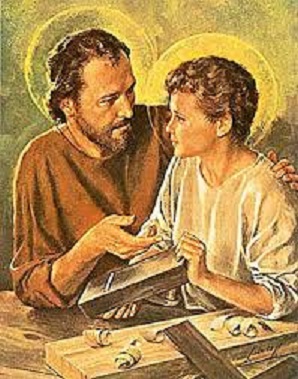
Traditions Monastiques
On earth Saint Joseph
watched over and protected Jesus and Mary,
That is why the Church
has made him the Protector
of the great Christian family.
We too should have full confidence in him;
he is willing and able to protect us…
He knows we are redeemed
by the blood of Jesus Christ
and destined for the happiness of heaven.
How then could he forget us?
To believe he could do so
would be to do him a serious wrong.
He distributes the treasures of the Heart of Jesus
and wishes to enrich us with them.
So let us go to him with confidence
and ask him for all the help we need.
He will give it to us.
Meditation is one.
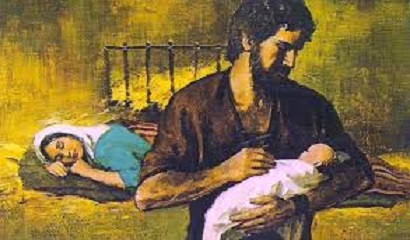
Catholic Resources
To capture the devotion to Saint Joseph within the Catholic liturgy, in 1870,
Pope Pius IX declared Saint Joseph the patron of the universal Church.
In 1955, Pope Pius XII added the feast of Saint Joseph the Worker.
This silent saint, who was given the noble task of caring and watching over the Virgin Mary and Jesus,
now cares for and watches over the Church and models for all the dignity of human work.
Tomorrow, Ordination to Deaconate, Kenji Konda MSC
Tomorrow, Ordination to Deaconate, Kenji Konda MSC
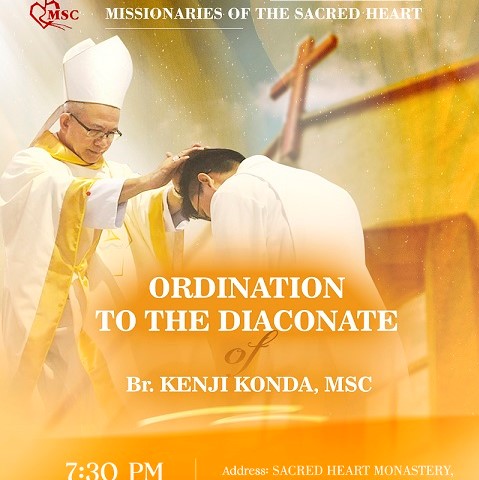
Our best wishes and blessings to Kenji on the occasion of his ordination as deacon, March 17th 2023.
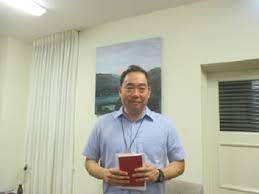
Kenji will be ordained by Bishop Terry Brady who, in the 1960s, shared our MSC life and has had a long ministry as priest and Auxiliary Bishop in the archdiocese of Sydney, now retired.
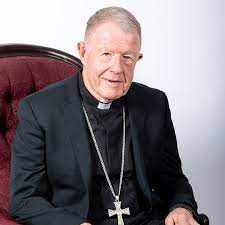
65

65
US, 2023, 93 minutes, Colour.
Adam Driver, Ariana Greenblatt, Chloe Coleman.
Directed by Scott Beck, Bryan Woods.
Back in the day audiences enjoyed movies with titles like Thel Land that Time Forgot, When Dinosaurs Ruled the Earth… In the 60s, Raquel Welsh was famous in 1 million years BC. But, in the 21st-century, we can go back 65 million years and, certainly, dinosaurs are very dominant.
What makes this action film different, and the explanation is given at the beginning, is that the focus is on sophisticated civilisations in other parts of the universe, especially with space travel, developments in technology, developments in weapons. So, when a pilot crash lands during an asteroid storm, he finds a planet in its “prehistoric” stages of evolution.
The film opens on the future planet, the pilot with his wife and daughter who is very sick, teaching her to whistle, but having to leave her on a mission, taking video footage of her as he travels. The asteroids are quite vivid, hurtling through space, myriads of them, causing the crash landing.
While the bulk of the vehicle lands at the bottom of a mountain, the rescue/survival unit is at the top of the mountain. The pilot, Mills (and congratulations to Adam Driver for a gruelling experience of survival) discovers a young girl who has survived while her parents, amongst the cryogenic passengers, have not. She does not speak the same language as the pilot and they have to learn to overcome her fears, her grief, finding ways to communicate.
In a sense, this story of survival is a walk through the woods (which look remarkably contemporary, filmed in Oregon and Ireland). But, of course, it is the creatures who live in the woods that are to be feared.
So, a range of dinosaurs, especially in gigantic dinosaur for the final confrontation, pterodactyls, spiders, scorpions… And Mills, confronting the creatures, fighting them off, but experiencing all kinds of climaxes, some literal cliffhangers, tree hanging, falls, being trapped in caves, the little girl having to climb a Cliff and let down a rope, ingenious in her steadying the rope. And flaming asteroids continually hurtling towards Earth.
So, one might say not a huge big budget spectacular, but an attempt to have a prehistoric setting and a futuristic technology clashing in just over 90 minutes. And, in view of no forthcoming addition to the Jurassic Park franchise, 65 will have to do.
- The title, 65 million years ago, the prehistoric past, aliens, civilisation developments and space journeys, weapons?
- The locations, the artificial beach on the initial planet, travelling through space, the asteroids, the forests, trees, waterfalls, caves? The musical score?
- The initial information, the time concerning Earth, space travel, prehistoric creatures on Earth?
- The special effects, spacecraft, travel, asteroid attack, the prehistoric creatures, dinosaurs, pterodactyls, scorpions, spiders, the creation of the prehistoric world contrasting with the alien civilisation, from Earth perspective, sophisticated space development?
- Introduction to Mills, wife and daughter, their life on the planet, her illness, teaching her to whistle, his having to travel, absence, her death? The video messages, with him on the spacecraft, playing them again? Koa watching them?
- The journey, the cryogenic passengers, the asteroids, the disaster, the crash, separation of escape pod on the mountain from the bulk of the craft? Audience interest in the technology of the spacecraft for this period?
- Mills, surviving, alone, hearing Koa, her age, not speaking the same language, the alienating effect, her repeating some of his words, the importance of home, family? Her missing her parents?
- The details of their trek through the woods, the terrain, trees, waterfalls, cliffs, falls? Their helping each other?
- The creatures, the dinosaurs, pterodactyls, insects, preying on each other? The attacks, the guns, fending them off? The night, trapped in the cave? The buildup to the finale, the giant dinosaur, Koa and the knife, the berry blood? Saving them both?
- The range of actions, seeming disaster, Mills and his fall and his shoulder, falling from the tree, hitting his shoulder into place? The cave, the narrow passage, Koa getting through? The rope and climbing the cliff? The explosives and using them against the creatures, to blast the rock?
- Memories of the 1970s and creature films from the past? A variation on the theme, two aspects of prehistoric life in the universe?
